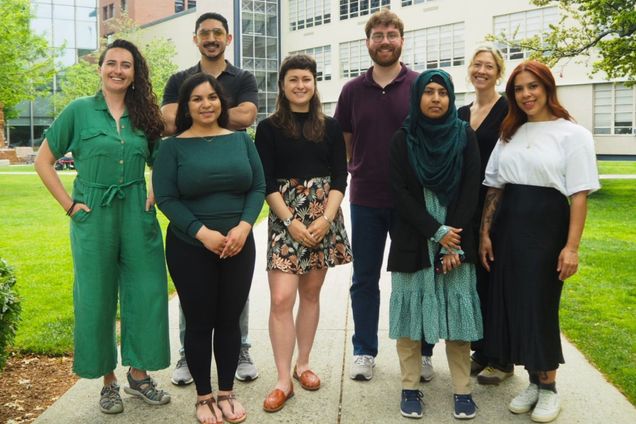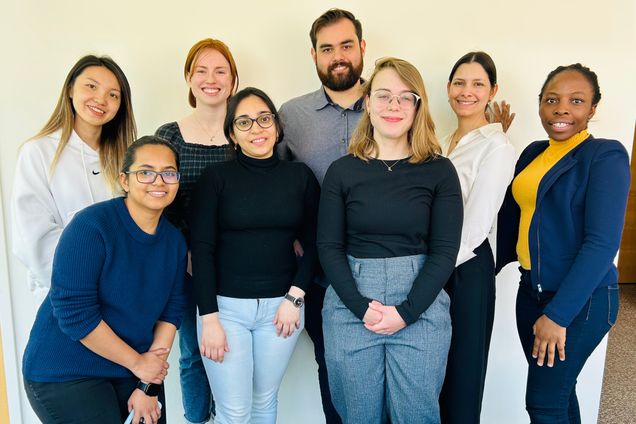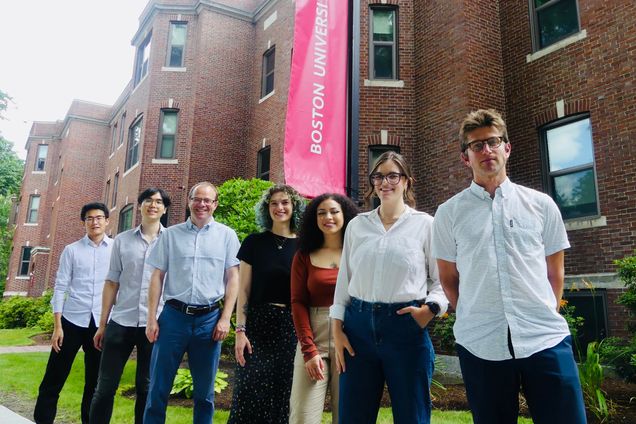Graduate Student Summer Fellows Project Archive
Get inspired by past student sustainability and climate research projects led by IGS Summer Fellows.
2024 Summer Fellows

The 2024 student fellows conducted sustainability research spanning economics, politics, and engineering. Learn about their research and explore their profiles below.
- Cultivating Resilience: Wastewatersheds as Beacons of Climate Adaptation in Agriculture, Adham Badawy (Earth & Environment, Graduate School of Arts and Sciences)
Research: How treated wastewater reuse can be utilized as a climate adaptation measure for agriculture. This fellowship is supported by the Impact Measurement & Allocation Program to help investors mitigate against the climate risks associated with water scarcity. - Rethinking How We Measure Indoor Heat Burden for People Living in Heat Islands, Pilar Botana Martinez (Environmental Health, School of Public Health)
Research: The value of novel approaches to characterizing the burden of heat exposure for vulnerable populations in ways that are relevant to health and wellbeing. - Assessing the Exposure of Socially Vulnerable Populations to Water Scarcity in Southern Europe: A Case Study of Portugal, Dalilah Paulino de Castro Campos (Earth & Environment, Graduate School of Arts and Sciences)
Research: How socially vulnerable populations are disproportionately exposed to water scarcity in Southern Europe. - Assessing the Carbon Sustainability of Photonic Computing for Artificial Intelligence Systems, Farbin Fayza (Electrical & Computer Engineering, College of Engineering)
Research: The carbon sustainability of photonics-based computing systems, which are used in data centers and autonomous vehicles for running artificial intelligence applications. - GDC-Infiltrated Solid Oxide Electrolysis Cells for Hydrogen Production and Grid-Scale Energy Storage, Emily Ghosh (Materials Science and Engineering, College of Engineering)
Research: The longevity of solid oxide electrolysis cells (SOECs) in clean hydrogen production to minimize environmental impact from energy consumption. - Empowering Belizean Communities: Science-Based Solutions for Coastal Ecosystems, Mira Kelly-Fair (Earth & Environment, Graduate School of Arts and Sciences)
Research: Ecosystem services to improve protection and restoration of mangrove forests in Belize. - Visualizing Modeled Spatial Patterns of Residential Heating Consumption and Efficiency in Massachusetts, Erin Polka (Environmental Health, School of Public Health)
Research: The spatial dynamics of residential energy patterns across Massachusetts and how energy consumption and efficiency differ across the state. - Cost Benefit Analysis of Greenhouse Gas Reduction Technologies and the Associated Health and Water Impacts in the United States, Brian Sousa (Environmental Health, School of Public Health)
Research: The infrastructure costs, emission reductions, health impacts, and water consumption of various renewable energy and carbon capture technologies in the United States. This fellowship is supported by the Impact Measurement & Allocation Program to enhance IMAP’s Corporate Carbon Risk project.
2023 Summer Fellows

The 2023 cohort of student fellows engaged in research on various sustainability topics, including climate and energy justice with the mentorship of National Renewable Energy Laboratory (NREL) staff.
- Developing a web-based tool to support energy justice in Massachusetts — Vedika Srivastava (Computer Science, Graduate School of Arts & Sciences)
- Investigating machine learning methods for improving numerical rainfall prediction in tropical climates — Lucía Vilallonga (Mathematics & Statistics, Graduate School of Arts & Sciences)
- Working on a sensor designed to spatially resolve local concentrations of ions in operating batteries, supporting smarter, safer batteries — Aaron Khan (Materials Science & Engineering, College of Engineering)
- Researching how underserved, vulnerable groups and neighborhoods cope with climate crises and designing collaborative governance institutions to support them — Xiaofei Qin (Earth & Environment, Graduate School of Arts & Sciences)
- Focusing on how cities across the United States are financing climate action and incorporating climate justice into their municipal budgets — Claudia Diezmartínez (Earth & Environment, Graduate School of Arts & Sciences)
- Examining human interactions with wildlife — Bright Olunusi (Earth & Environment, Graduate School of Arts & Sciences)
- Studying the electrochemistry and microstructure of solid oxide fuel cells to increase their efficiency as a renewable energy resource — Jillian Mulligan (Materials Science & Engineering, College of Engineering)
- Assessing the likelihood of electric utility companies in the US achieving their carbon reduction targets — Sakshi Sharma (Computer Science, Graduate School of Arts & Sciences)
2022 Summer Fellows

IGS’s inaugural class of summer student fellows conducted independent, interdisciplinary research across a broad spectrum of sustainability topics related to planetary health, energy systems, and climate governance:
- Exploring sustainability and equity in Boston’s bicycle infrastructure — Cori Barnes (Earth & Environment, Graduate School of Arts & Sciences)
- Marginalized community impacts and sustainability initiatives regarding climate heat extremes in Boston — Sasha Gilmore (Earth & Environment, Graduate School of Arts & Sciences)
- Investigating the feasibility of distributed energy storage and generation technology as a supporting infrastructure in the Azores’ transition to renewable energy — Allan Rego, (Mechanical Engineering, College of Engineering)
- How climate change messaging impacts viewership, perception, and intention to act among sustainability-oriented media consumers — Stephanie Strickland (Media Studies, College of Communication)
- New materials screening for calcium looping sorbent at room temperature using photochemical decomposition — Jing Trerayapiwat (Chemistry, Graduate School of Arts & Sciences)
- Incorporating the idea of social preferences into the existing “carbon reduction willingness to pay” model — Liaoyuan Zhang (Economics, Graduate School of Arts & Sciences)